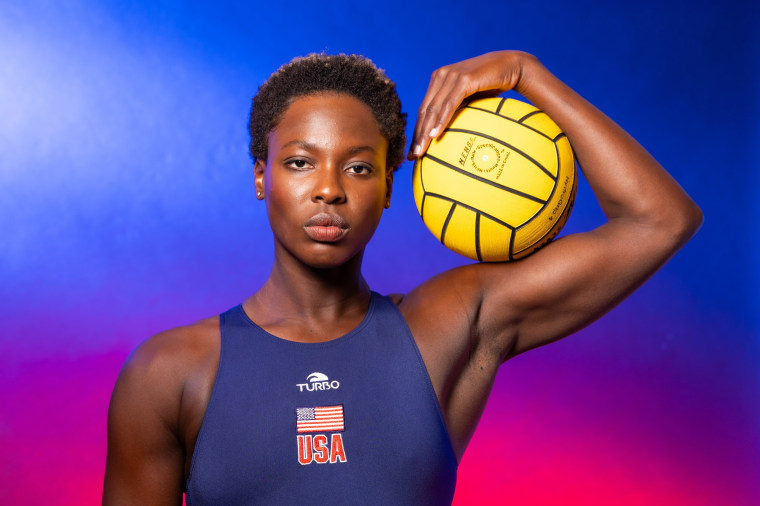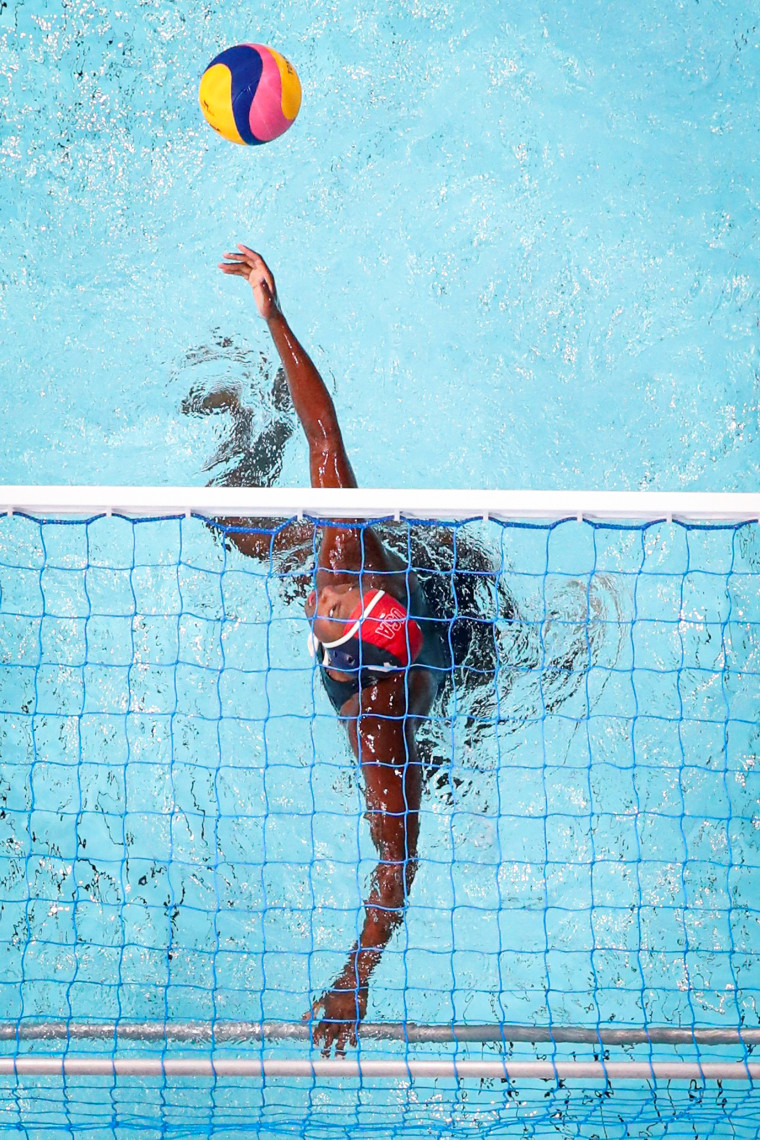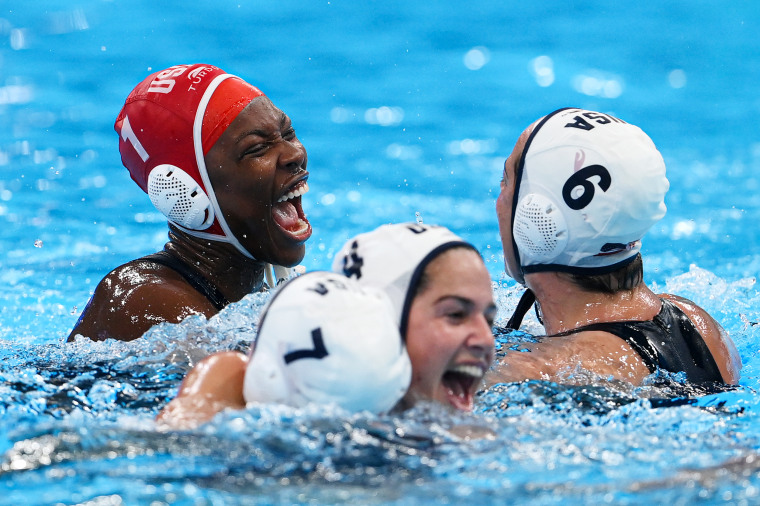Growing up in Miami, Ashleigh Johnson and her four siblings took swimming lessons as kids, primarily to ease the mind of their mother, who feared they could drown in the family pool while she was at work.
Those lessons led to falling in love with swimming, which led to joining the local Riptides swim team at nearby Cutler Ridge, which eventually led them to a unique sport for Black youths: water polo.
Johnson’s sister and three brothers all took lessons from Carroll Vaughan and thrived in the sport. But Ashleigh Johnson soared as a goalkeeper, using her spindly body, quickness and understanding of angles to become an All-American at Princeton University, where she compiled 100 victories and was the school’s all-time saves leader.
In 2016, she became the first Black athlete to make the U.S. Olympic team in water polo — and earned a gold medal. She backed it up with another gold in the Tokyo Games four years later. At 29, Johnson is widely considered the best at her position in the world.

While she desperately wants to win a third gold medal in Paris this summer, Johnson said just as important to her is having an impact on young people — especially in underserved communities.“The longer that you play a sport, the less it becomes about you,” Johnson said. “I remember when I was young on this national team and just starting to find my footing, I didn’t understand why it was important for me to be here. But I understand now. As a Black woman of Caribbean descent in this sport, I definitely feel a special obligation to be a light for little Black and brown girls — and boys — who may be interested in swimming and water polo. That’s really special and is a priority for me.”
Johnson’s younger sister, Chelsea Johnson, now 28, also played water polo at Princeton. Vaughan said she could count on them to come back home to hold clinics for local kids.
Meeting and spending time with children remains one of Johnson’s favorite aspects of competing.
“It’s so cool to see how inspiring the sport can be,” Johnson said. “These kids sometimes share their experiences, their struggles, and the chances are I’ve been through something like they have been and [I’m] able to give them some words of encouragement. We’re all unique in some way, but we’re all so similar in other ways. And getting to have these experiences with the kids makes us all really strong.”
Johnson’s Jamaican mother, Donna Johnson, basks in her daughter’s achievements. But what gratifies her the most, she said, is her daughter’s personal growth on a journey in which she has often been the only Black person in the pool.
“I didn’t even know what water polo was,” Donna Johnson said. She was a home health care nurse and a single mother who didn’t feel comfortable leaving her kids at home with a sitter until they learned to swim.
“I had these horrible nightmares and daymares of them falling into the pool and them all trying to save each other, but all drowning together,” she said. Through the simple act of finding her children a place to learn to swim, water polo became so important in their lives. “And for Ashleigh,” she said, “I am very happy that playing the sport has helped her grow into someone who loves to inspire kids.”
To get to that place was not easy. Once Ashleigh Johnson and her siblings began competing outside of their area in Miami, they quickly found themselves as the only Black players on their teams. The sisters played together at Princeton, but after Chelsea’s first year, Ashleigh was off to play on a national team. It was a significant next step, but challenging.

“I saw that she was very athletic when her mother brought all her kids to me,” Vaughan said. “Ashleigh was 8 or 9. She just got better and better. When she went to the national team in California, though, it was very tough for her.” Vaughan said the coaches “only saw negatives in her. There were times when she wanted to quit. But she hung in there and finally broke down the barriers they had put up.”Being the only Black athlete in competition was another barrier.
“At the very base of it, I really wanted to play water polo and I had a lot of fun and was really passionate about the sport,” Johnson said. But being away from her old team and family in Florida, and submerged in a swim culture foreign to her, she said, was isolating. “I was like, ‘I love doing this, but I don’t want to have to deal with that.’”
Her mother was unaware of her conflicts. “I didn’t realize she felt alone a lot of the time,” Donna Johnson said. “I raised my children to see people as people, which, in retrospect, was a very naive stand. I was never concerned about that aspect. I was more concerned about her being taken care of since I wasn’t there. But as I became more enlightened, I realized she was the only Black in most cases, which is an American condition for Black people.”
Johnson and her brothers and sister were fortified, however, by “the foundation my mother built in all of us,” she said. “She instilled in us that we are worthy and beautiful and belong. So as much as there were times when I felt isolated, I actually felt more powerful being there. I also had a realization that because I was different didn’t make me stand out in a bad way. You end up realizing you have the power to change that and to make it a welcoming space for other Black people or brown people who may come after you.”

Johnson, who has a bachelor’s degree in psychology, said she is not sure what’s next for her after the Games. However, she said, “Life is calling me. And it’s a real privilege to choose when you stop playing.” If her water polo career ends this summer, Johnson said her post-athletic life will begin as a search for her place. She eventually wants to start a family. She is considering culinary school. She may move to another country and “pursue a trade there.”
“I’ve put a lot of time into this and not a lot of time exploring other parts of myself,” she said. “I think that’s a journey that everyone needs to go on in their life. So that is exactly where I am. I want to give myself the space to just explore.”For more from NBC BLK, sign up for our weekly newsletter.











